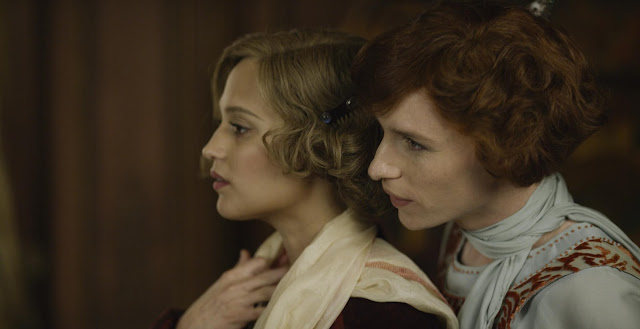A treatise on the fluidity of sexuality
A Potpourri of Vestiges Review
By Anirban Lahiri
Featured in IMDb Critic Reviews
 |
| The Danish Girl (2015) - By Tom Hooper |
Our Rating: 7.5
IMDb Ratings: 6.6
IMDb Ratings: 6.6
Genre: Biography | Drama | Romance
Cast: Eddie Redmayne, Alicia Vikander, Amber Heard
Language: English
Runtime: 119 min
Color: Color
Summary: Danish landscape painter Einar Wegener finds the inner girl within himself. He struggles with the choice to bring her to the surface of his body, or not to. It is Lili's life at the price of Einar's death. The time is 1930. The choice is not easy.
Some films successfully defy categorization. The King's Speech (2010) director Tim Hopper's The Danish Girl is such one. It is more than the Danish artist Einar Wegener's biopic, or his gradual transformation to the girl inside her - Lili Elbe. It is not a love story, between the couple - Einar and Gerda Wegener, although a striking love story is embedded in the narrative. It is more than a simple story on sexuality too.
Michel Foucault, the French Cultural chronicler and philosopher, first approached the fluidity of sexuality in a methodical manner. In his series of works on the European, rather human, culture - Birth of the Clinic, Discipline and Punish: Birth of the Prison, Madness and Civilization, Order of things, Archaeology of knowledge, and definitely, the three volume extensive, lucid, work on the history of sexuality - Foucault looked through the categories of identity as reinstated and normalized by human cultures, through generations.
Foucault was the first modern writer to grossly point out that the sexual identity, as well as an individual's sexuality [i.e., hir (I use the peculiar pronour hir to mean both his/her; however, the generalization of genders may face criticism - gender may not be an imaginary category only sustained through an individual's classification by others. It may be fluid, non-static. But, that does not mean, at a particular point of time, gender does not have any sacrosanct meaning within the individual) biological-emotional-instinctive-socially-conditioned inclination to the others, based upon their sexuality], is fluid - non-static. Sexuality, as well as an individual's perception of hir own gender, depends on multiple factors - assignment of sex at birth at the hospital, identification by the peer groups at school, playground, home and work, further socialization through family, journeys and reading, interpersonal and group relationships etc.
Foucault's works were not an elite apolitical observer-theorist's ivory-tower mulling over culture and its deviations. They reflected the kind of confusion, and mirroring, the contemporary societies were going through. With the 19th Century affluence of a capitalist colonial world, Europeans had some leisure to poner over their own behavior, some of which they collectively chose to ignore before. The biological assignment of sex, sexuality and gender were never fixed categories in any part of the world, throughout human history. But, they seldom faced the collective questioning that began about 150 years ago.
By the time of Einar, the end of the first quarter of the 20th Century, at least some individuals dared to be upfront about that, without shame that the Victorian prudery instilled in their generation, and their dads'.
The Danish Girl is a direct hit at what happens to you when your sexuality accidentally opens out in adulthood. Einar's wife Gerda asked him to pose for her when her regular model was absent one day. Initially he resisted posing in a girl's stockings and dress, for his art-deco painter wife. But, soon he found himself to be most comfortable in this new avatar. An accidental opening led to casual escapades to the social circles of Copenhagen where Gerda introduced him as Lili, Einar's cousin.
The peculiarity of Hopper's film lies in its unhollywoodish compositions from shot to shot. In a regular, classical, visual psychology mode, the meeting of the couple at the Royal Danish Academy of Fine Arts, and the subsequent months of dating, are shown in ultrawide lens distortion, with canted background, and sometimes in totally canted frames. The personal, emotionally close, shots are almost always painted in the Academy Aspect Raio (1.33 or 4:3). The position of the characters jump from left sqaure box to the right sqaure box in the reverse shots of 2-shots, which is quite surprising to see from a British film shot in 1.85:1 wide screen format.
 |
| Alicia Vikander as Gerda Wegener in The Danish Girl |
These were times of psychological upheaval. Freud's work began changing the perception of individuality and its construction as an interaction between the person and the society, while major researches were out on genetics, and linked genetic characteristics. It is seriously enlightening to see how an emotional artist becomes vulnerable to the conflict generated by hir inner woman, who succeeds to come out in the end.
This film would be a strong contender in several categories of this period piece of identity drama in the 1920s-30s Denmark, Paris and Germany, with its truthful depiction and critique of the change in the erstwhile Western Europe, and the ensuing reaction. Eddy Redmayne is on the way to give a tough competition to Bryan Cranston, Leonardo DiCaprio, Matt Damon and Michael Fassbender.
Readers, please feel free to share your views/opinions in the comment box below. As always your insightful comments are highly appreciated!
References:
The Danish Girl (2015) Trailer
People who liked this also liked...




0 comments:
Post a Comment
Thanks for sharing for valuable opinion. We would be delighted to have you back.